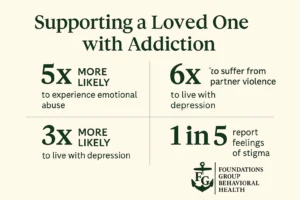You love them.
That hasn’t changed.
But nearly everything else has.
Maybe the drinking started slowly—wine with dinner, a few beers to unwind. Maybe the pills were from a friend, or the weed felt “better than nothing.” At first, it didn’t scare you. It frustrated you. But over time, it hurt. The late nights, the lying, the disappearances—emotional or physical. The feeling of talking to someone who isn’t really there.
And now, here you are. Still loving someone who is still using. Still hoping they’ll choose help. Still unsure what’s okay to feel.
And quietly asking: What about me?
At Foundations Group Behavioral Health in Cape Cod, MA, we work with partners and spouses in this exact situation. You may not be the one with the addiction, but you are deeply affected by it. And you deserve support, too.
That’s where mental health therapy comes in—not as a rescue, not as an ultimatum, but as a place to finally breathe.
Therapy Isn’t About “Fixing” You—It’s About Holding You
Being in a relationship with someone actively using can make you feel like the emotional ground is always shifting. One moment you’re hopeful. The next, you’re heartbroken. You’re walking on eggshells, bracing for mood changes, lies, or silence. You’ve become an expert at hiding your own pain just to keep the peace.
And through it all, you’re trying to be okay.
Mental health therapy gives you space to stop pretending you’re okay and start being real—without judgment, without shame. It’s where you can say the things you’re afraid to say out loud:
- “I love them, but I hate this.”
- “I’m scared every time they come home.”
- “Sometimes I wish I could disappear.”
You don’t have to explain why you’re still here. You just get to be here, held by someone trained to help.
You’re Not Wrong for Still Loving Them
This is one of the hardest parts.
People on the outside often don’t get it.
They say:
“Why don’t you just leave?”
“They’re never going to change.”
“They don’t care about you.”
But they don’t see the softness in your partner’s eyes when they’re sober. The shared jokes. The memories. The way you still see the real them inside all of this.
Love doesn’t vanish just because someone is hurting.
Mental health therapy helps you hold onto your love without losing yourself in their struggle. It doesn’t force you to make decisions you’re not ready for. It helps you strengthen your center—so if and when you do choose change, it comes from clarity, not collapse.
Boundaries Are Not Walls—They’re the Bridge Back to Yourself
In relationships affected by substance use, boundaries often blur. You cancel plans to monitor them. You lie for them. You minimize your needs so you don’t “push them away.”
It’s not weakness. It’s survival.
And therapy helps you gently unwind that.
Boundaries in therapy are framed not as control or punishment, but as acts of self-trust. That might mean:
- Creating space when they’re using
- Saying no to rescuing behaviors
- Choosing how and when to engage emotionally
Boundaries are the way back to yourself. They’re not about giving up on your partner. They’re about no longer giving up on you.
Guilt and Responsibility Are Not the Same
When someone says, “You’re the reason I use,”—it sticks.
When they say, “If you just trusted me more, I wouldn’t drink,”—you start to wonder if it’s true.
That’s the heartbreaking trap many partners fall into: absorbing blame for someone else’s choices. In therapy, we name this for what it is—emotional responsibility displacement. And then, we help you start untangling your identity from their behavior.
You may still love them.
You may still want to help.
But you’ll begin to understand this: You didn’t cause this. And you can’t cure it. But you can care for yourself.
Therapy Makes Room for Grief—Even If You’re Still in the Relationship
There is real grief in loving someone who’s using.
Grief for who they were. Grief for the future you pictured. Grief for the emotional safety you’ve lost. And perhaps hardest of all, grief you don’t feel “allowed” to name—because they’re still alive, still with you, and yet not the same.
Mental health therapy offers a space to process this kind of grief—ambiguous, layered, ongoing. You can cry without explaining. You can rage without guilt. You can tell the truth without worrying it will break something.
Because it’s already broken—and therapy helps you hold that reality, gently and with care.
We Work with People Like You in Cape Cod, MA
You’re not alone in this. At Foundations Group Behavioral Health, we support spouses, partners, and loved ones in Barnstable County and Falmouth who are walking this complicated path.
Some are quietly planning to leave. Some are trying to stay—lovingly, but with new boundaries.
Some are just trying to make it through the week.
Therapy isn’t about a one-size-fits-all outcome. It’s about helping you feel less alone in the swirl.
FAQ: Mental Health Therapy for Partners of People Who Use
Is therapy only helpful if I’m planning to leave?
No. Therapy is for you, no matter what you choose. Whether you’re staying, unsure, or thinking of leaving—it supports your clarity and emotional strength.
What if I’m afraid of saying the wrong thing in therapy?
That’s normal. But you don’t have to have the “right” words. Therapy is a space where you don’t have to perform. You just get to be human, messy, scared, and real.
Can therapy help if my partner is emotionally abusive while using?
Yes. Therapy can help you name patterns that feel unsafe and explore options in a way that respects your autonomy. You’re never pressured—but always supported.
What if my therapist doesn’t understand addiction?
At Foundations, our therapists are experienced in working with addiction-affected relationships. We understand the nuance, the loyalty, the grief. You’ll never be shamed for loving someone who’s struggling.
Is it okay to want peace, even if I still love them?
Yes. That’s the heart of this work: learning how to want peace without shame. Love and peace are not mutually exclusive—and therapy helps you hold both.
What Healing Starts to Look Like
For many of our clients, healing doesn’t look dramatic.
It looks like:
- Waking up and not feeling dread
- Setting a boundary without shaking
- Enjoying a moment of laughter without guilt
- Making a plan for the future that includes your needs
Therapy doesn’t change your partner.
It changes what you believe you’re allowed to want.
And that’s a shift that echoes through everything.
You’re Still in This Love Story—But You Deserve a Chapter, Too
Loving someone in active addiction is like being in a story where you’re always the supporting character.
Mental health therapy reminds you: You are allowed to be the main character of your own life again.
Call 888-685-9730 or visit our mental health therapy services page to learn how we can help you find your voice, your clarity, and your steadiness—no matter what chapter your relationship is in.
You don’t have to stop loving them to start caring for yourself.









